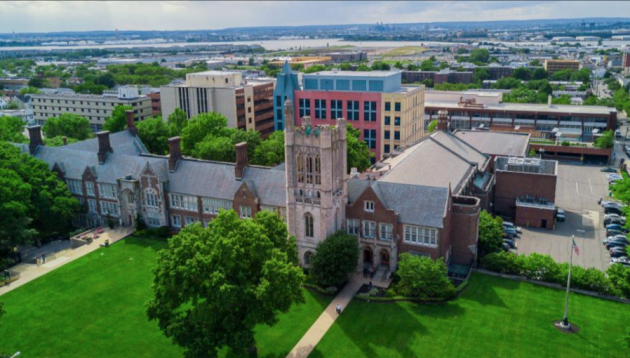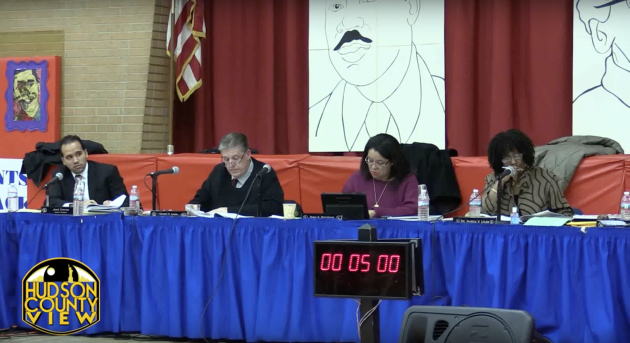New Jersey City University (NJCU) “likely violated federal law” by improperly allocating $14 million in COVID-19 relief funds to cover the costs of a scholarship program, a report by the New Jersey Office of the State Comptroller says.

By John Heinis/Hudson County View
“With the University in this unstable financial position, NJCU senior administrators submitted a budget for approval by the Board of Trustees (the Board) that proposed using nearly $14 million in federal COVID-19 relief funds to pay for an existing institutional scholarship program,” the report says.
The comptroller’s office noted that after interviewing about 30 current and former members of NJCU’s Board of Trustees, administration, staff, and faculty and reviewing 50,000 pages of documents, they determined that administrators knew such an action was improper.
” … OSC found that NJCU’s former administrators were aware that using federal COVID-19 relief funding from the Higher Education Emergency Relief Fund (HEERF) to fund the existing institutional scholarship program likely violated federal law,” they wrote.
“Nevertheless, rather than presenting a budget that reflected the University’s actual financial position, the senior administrators proposed this use to the Board without informing the Board of serious potential risks. The Board adopted the proposed budget.”
NJCU’s financial woes have been well documented in light of the retirement of their former president, Dr. Sue Henderson, which was made effective July 1st, where she received six-figure compensation package.
“The University planned to improperly fund approximately eight percent of the expenses in the 2022 budget—nearly $14 million—using federal COVID-19 relief funding from the Higher Education Emergency Relief Fund (HEERF),” the comptroller’s office indicated, also noting that the money was supposed to go directly to students.
“NJCU’s planned use of these funds—to fund existing institutional scholarship expenses—violated restrictions on the use of the funds. At the time they presented the budget to the Board, and for months thereafter, NJCU’s administrators knew that federal law likely prohibited them from using the funds for the purpose identified in the budget.”
NJCU’s administrators still submitted this budget to their Board of Trustees, who adopted the spending plan on June 28th, 2021.
According to the comptroller’s office, the NJCU administrators “did not notify the trustees that the planned use of these funds violated federal restrictions nor did they take any corrective action until a new CFO was hired, more than ten months later.”
Furthermore, the administration relied on cash reserves to fund the scholarship program, resulting in a year end deficit of approximately $13.8 million. One year later, the trustees declared a financial emergency.
“The communications prior to the adoption of the budget indicate that the former CFO, the President, and the Enrollment VP were on notice that using HEERF to fund institutional scholarships was likely impermissible,” the report states.
“Using the funds for such a purpose was also inconsistent with the way in which NJCU had used its prior HEERF allocations.”
While the former CFO said he presented the budget the way he was instructed to by Henderson, she disputed that she was ever told using funds in this fashion was impermissible.
She could not be reached for additional comment.
The extensive report also claims that the Board of Trustees were not properly trained, that declining enrollment played a big role in their financial woes, and that they spent heavily on development and consultants to increase enrollment, which was unsuccessful.
They also call for an independent financial monitor at NJCU, to oversee both their finances and their board of trustees.
The comptroller’s office also makes two recommendations to the state legislature.
One, they want an evaluation on whether the Office of the Secretary of Higher Education’s existing powers can “guard against poor decisions” made by public universities, and two, to authorize and direct the OSHE to institute requirements related to financial reports and budgets of public universities.
Matthew Boxer, a partner at Lowenstein Sandler, New Jersey’s first comptroller, and outside counsel for NJCU, said the report confirms what NJCU has said from the beginning: that no funds have been misappropriated.
“NJCU is pleased that the Comptroller’s findings reinforce what the University has consistently maintained – no funds were misappropriated. The Report makes clear that years-long budget issues, exacerbated by the pandemic and low student enrollment, were significant contributors to the University’s financial crisis,” he said.
“The prior senior administrators whose conduct is discussed in the Report are no longer employed at the University, and it was the immediate action by current University leadership upon learning of the financial crisis that decreased the budget deficit of $22 million by approximately 50%. The Interim President’s partnership with the unions at the University was critical in decreasing the deficit.”
He continued that the board of trustees support the current administration of Interim President Andrés Acebo, and appreciates everyone at the state level for their commitment to higher education.
Gov. Phil Murphy (D) wrote a letter to the comptroller requesting an investigation, which was seconded by Jersey City Mayor Steven Fulop, in August. Neither could be immediately reached for comment Thursday morning.
During a virtual Q & A with the media, New Jersey Comptroller Kevin Walsh said that he could not comment on whether or not any of their findings were referred to law enforcement.








